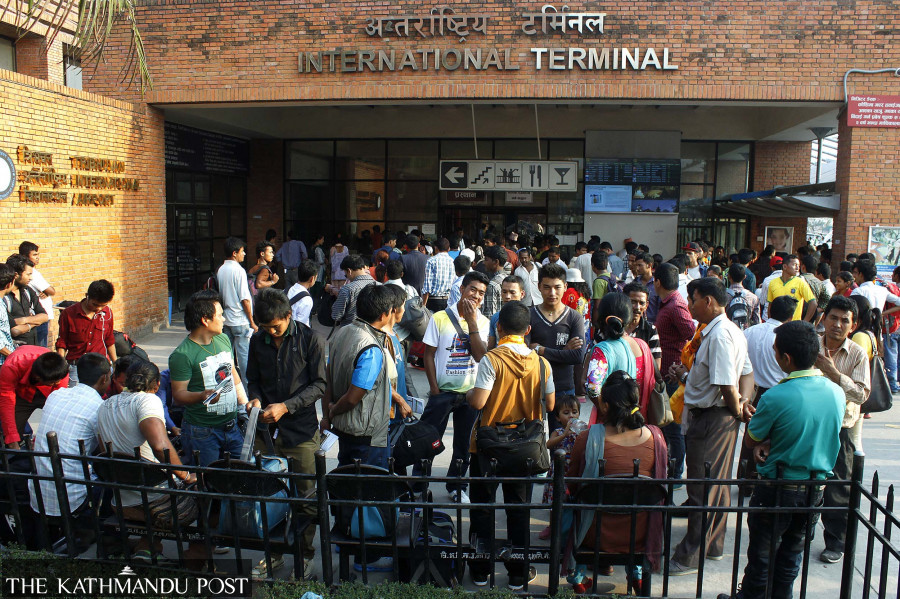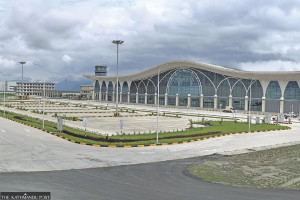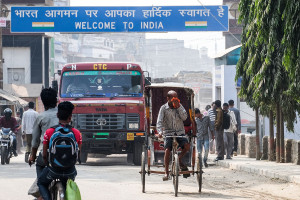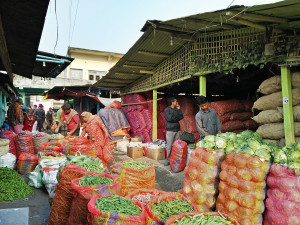Money
Social security extended to migrants, informal workers and self-employed
According to the Social Security Fund, 381,000 employees and 17,535 employers in the private sector are currently enrolled in the scheme.
Pawan Pandey
The Social Security Scheme is set to be expanded to include migrant workers, informal sector workers and self-employed persons in its membership.
The contribution-based plan launched four years ago currently benefits only formal employees in the private sector.
The Ministry of Labour, Employment and Social Security passed two working guidelines on December 11 to enlarge the social safety net.
The first guideline related to migrant workers will come into effect on March 10 next year, and the second one related to the informal sector and the self-employed will be implemented from April 14.
Labour rights organisations have long been demanding that the coverage be extended to the informal and self-employment sectors too.
Workers in the informal sector and self-employed persons will be offered financial security under four categories. The first support scheme is for regular medical check-ups, health protection and maternity plans.
The second is support for accident and disability plans. The third is support for dependent family, and last one is the old-age security plan.
Migrant workers and self-employed persons living abroad will be entitled to receive three of the four benefits—except medical treatment, health protection and maternity coverage.
“It’s not logical to provide medical treatment, health protection and maternity coverage to migrant workers who live abroad,” said Bibek Panthee, spokesperson for the Social Security Fund Secretariat.
Migrant rights experts and trade union leaders have lauded the directive as being a much-needed step of the government to ensure the welfare of workers, but they doubt it will be properly implemented.
“The government has taken a commendable step,” said Ganesh Gurung, a senior labour migration expert. “However, the question is how effectively it will be implemented, especially given the lacklustre response the contribution-based Social Security Scheme has received so far.”
The KP Sharma Oli administration had expected tens of thousands of private sector workers and their employers to participate when the scheme was launched.
According to the Social Security Fund, 381,000 employees and 17,535 employers had joined the scheme as of mid-December. It has collected Rs27 billion in contributions and issued financial assistance totalling Rs2.9 billion so far.
Migrant and informal sector workers and self-employed persons must have contributed for nine months in a 12-month period to be eligible to receive the benefits, according to the guidelines.
Migrant workers or self-employed persons based abroad have to contribute an amount equivalent to at least 21.33 percent of the basic salary fixed by the Nepal government for domestic industrial workers. The maximum amount they can contribute is three times the basic salary.
Domestic informal sector workers have to contribute 11 percent of their minimum basic salary while the government will chip in another 9.37 percent.
“While some local governments have been positive about paying their share of the contribution to informal sector workers, we aim to convince other local as well as provincial governments to participate in the scheme by the time the guidelines come into effect,” said Panthee.
While the minimum salary determined by the government is Rs15,000, the minimum basic salary, according to Panthee, is Rs9,385.
Binod Shrestha, president of the General Federation of Nepalese Trade Unions, a labour union affiliated with the CPN-UML, said that it would be unfair for the government not to provide assistance to informal sector workers in the social security scheme.
An analytical report on the informal sector published by the Central Bureau of Statistics shows that out of the 3.22 million persons employed in the country, 25.8 percent or 832,187 persons are employed in the informal sector.
These informal enterprises play an important role in the economy, especially in terms of their contribution to job creation, but are part of the economy that is neither taxed nor monitored, the report said.
In addition, it also represents a sector with poor working conditions and absence of social security.
“Ensuring social security of every worker has been the demand of Nepal’s trade union movement for the past two decades,” said Shrestha. “But when the scheme was launched four years ago, it too prioritised formal sector workers who receive comparatively more benefits than those in the informal sector.”
Under the new guidelines, self-employed individuals have to contribute 31 percent of their minimum basic salary to the fund every month.
While 7.48 percent of the contribution made by migrant and self-employed workers abroad will be collected to cover accidents and disability cases as well as the dependent family plan, 13.25 percent will go for the old-age security plan, according to the guidelines.
Under the accidents and disability plan, the fund will bear hospital expenses of up to Rs100,000.
Those who sustain injuries and become unable to continue their work for a temporary period will be eligible for a monthly benefit equal to 60 percent of their minimum basic salary until they recover and rejoin work.
In case of permanent disability, the fund will pay the contributor a lifetime monthly pension.
Other financial assistance will be provided to the family through a pension plan for the widow or widower and an educational allowance, each amounting to 40 percent of the minimum basic salary of the contributor.
While the pension will be provided on a monthly basis for a lifetime, the educational allowances will be paid until the child reaches 18 years of age or continues to study until they complete 21 years.
The assistance will be terminated if the widow or widower remarries. In case of multiple children, the allowance will be divided among them.
If there is no widow or widower or children, either of the dependent parents will receive a lifetime monthly pension. The amount will be divided between the parents if any disagreement arises.
Upon reaching 60 years of age, the contributor receives a lifetime pension on a monthly basis.
Of the 21.37 percent contributed by an informal sector worker, 10.37 percent will go for medical treatment, health protection and maternity plan; accidents and disability plan; dependent family plan, and another 10 percent for old-age security plan.
Similarly, self-employed individuals in the country will have to contribute at least 31 percent of the minimum basic salary to the fund just like formal private sector workers.
Of the 31 percent, 1 percent will go for medical treatment, health protection and maternity schemes; 1.40 percent for accidents and disability plans; 0.27 percent for dependent family plans; and 28.33 percent for pension or old-age security schemes.
The scheme has a provision of providing retirement pension to workers aged over 60 who have contributed to the fund for 15 years.
In case of accident and injury, the fund will cover up to Rs700,000 of the medical expenses of informal sector workers and self-employed individuals in the country.




 7.12°C Kathmandu
7.12°C Kathmandu















